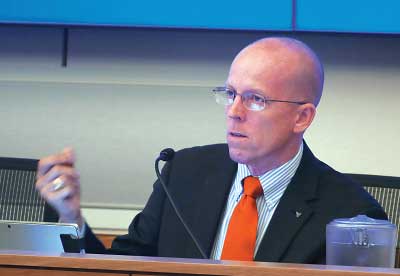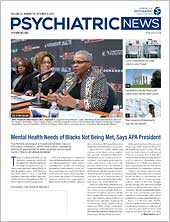Mental health advocates typically go to legislators in a crisis when they want to solve a problem or lobby for funding for services. Psychiatrist Joel Silverman, M.D., chair of the Department of Psychiatry at Virginia Commonwealth University (VCU), had a different idea: talk to lawmakers about the issues that matter to mental health professionals and their patients before the crisis happens.
That was the idea behind the “Mental Health Mini-University,” a day-long event held at Virginia’s Capitol in which leading psychiatrists from the VCU School of Medicine discussed two crucial issues—the mental health workforce and health impact of alcohol, marijuana, and opioid use—before a panel of 11 General Assembly members and members of a state mental health advisory commission.
“Instead of going to the legislature with specific proposals to fund, I thought we needed a different kind of model where we—the Department of Psychiatry at VCU—would come up with some educational objectives and invite legislators to come and learn about issues that really impact the public and their constituents,” Silverman told Psychiatric News. “I received a lot of support from the university to pursue this because the legislature has a very large role in funding training in psychiatry.”
Psychiatrist Peter Buckley, M.D., dean of the VCU School of Medicine,
discussed development of the mental health workforce and Mishka Terplan, M.D., M.P.H., associate director of addiction medicine at VCU, discussed substance use disorders and the opioid epidemic. Also speaking was Hughes Melton, M.D., commissioner of the Virginia Department of Behavioral Health and Developmental Services.
The mini-university was sponsored by the VCU Department of Psychiatry and the L. Douglas Wilder School of Government and Public Affairs in conjunction with the Deeds Commission. The Deeds Commission is an advisory group formed by state Sen. Creigh Deeds in 2013 after his son assaulted him and later died by suicide. Deeds had been unable to secure his son a bed in a psychiatric hospital.
“Sen. Deeds has become highly focused and a tireless supporter for improvements to the mental health care system in Virginia,” Silverman said.
Silverman said he hopes to make the mini-university an annual event. “Certainly, if the event leads to more informed lawmakers, we will have been successful.”
The kinds of questions and dialogue prompted by the mini-university indicated an already well-informed group of lawmakers: they queried Buckley, Silverman, Terplan, and Melton about graduate medical education funding, early identification of mental illness by school personnel, and use of cannabidiol oil as a potential treatment for schizophrenia, among other subjects.
Terplan, during his address, especially emphasized that substance use disorders are chronic illnesses, while the standard treatments—such as 28-day rehabilitation programs—are acute treatments. “Recovery happens in the community, after acute treatment, and requires ongoing, continuing care,” Terplan said.
It’s a message that appeared to sink in. “We’re really treating a chronic illness with a short-term treatment,” said Delegate Rob Bell after Terplan’s talk.
Silverman said a key objective of the event was to remind legislators that although the opioid epidemic has taken center stage, alcohol and marijuana use continue to exact an enormous public health toll. “Opioids have taken over the national discussion, but alcohol continues to be a major cause of medical and psychiatric morbidity,” he told Psychiatric News. “The reality is that in the United States, most substance abuse is polysubstance abuse, so we wanted to make the point that while addressing abuse of opioids is important, they are part of a larger, overall epidemic of substance abuse.”
Silverman cited evidence that the tide is turning against mental illness stigma in Virginia. He noted that the VCU Wilder School of Public Policy conducted a survey of a random sample of 800 state residents, 80 percent of whom listed psychological services for children in schools as a top priority. The survey also found a high degree of concern about violence in schools and suicide.
“For years psychiatry has struggled with stigma and the sense that our patients have been misunderstood,” Silverman said. “This information suggests that there is a real shift and the public is starting to understand and appreciate the importance of mental health for our families, children, and communities. This feels like a sea change.” ■


